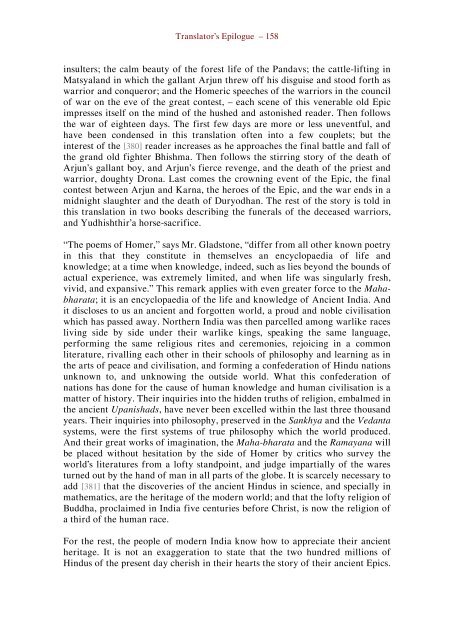Mahabharata, Epic of the Bharatas
An Abbreviated Translation of the Indian Classic, the Mahabharata by Romesh Chundar Dutt in 2,000 verses
An Abbreviated Translation of the Indian Classic, the Mahabharata by Romesh Chundar Dutt in 2,000 verses
You also want an ePaper? Increase the reach of your titles
YUMPU automatically turns print PDFs into web optimized ePapers that Google loves.
Translator’s Epilogue – 158<br />
insulters; <strong>the</strong> calm beauty <strong>of</strong> <strong>the</strong> forest life <strong>of</strong> <strong>the</strong> Pandavs; <strong>the</strong> cattle-lifting in<br />
Matsyaland in which <strong>the</strong> gallant Arjun threw <strong>of</strong>f his disguise and stood forth as<br />
warrior and conqueror; and <strong>the</strong> Homeric speeches <strong>of</strong> <strong>the</strong> warriors in <strong>the</strong> council<br />
<strong>of</strong> war on <strong>the</strong> eve <strong>of</strong> <strong>the</strong> great contest, – each scene <strong>of</strong> this venerable old <strong>Epic</strong><br />
impresses itself on <strong>the</strong> mind <strong>of</strong> <strong>the</strong> hushed and astonished reader. Then follows<br />
<strong>the</strong> war <strong>of</strong> eighteen days. The first few days are more or less uneventful, and<br />
have been condensed in this translation <strong>of</strong>ten into a few couplets; but <strong>the</strong><br />
interest <strong>of</strong> <strong>the</strong> [380] reader increases as he approaches <strong>the</strong> final battle and fall <strong>of</strong><br />
<strong>the</strong> grand old fighter Bhishma. Then follows <strong>the</strong> stirring story <strong>of</strong> <strong>the</strong> death <strong>of</strong><br />
Arjun’s gallant boy, and Arjun’s fierce revenge, and <strong>the</strong> death <strong>of</strong> <strong>the</strong> priest and<br />
warrior, doughty Drona. Last comes <strong>the</strong> crowning event <strong>of</strong> <strong>the</strong> <strong>Epic</strong>, <strong>the</strong> final<br />
contest between Arjun and Karna, <strong>the</strong> heroes <strong>of</strong> <strong>the</strong> <strong>Epic</strong>, and <strong>the</strong> war ends in a<br />
midnight slaughter and <strong>the</strong> death <strong>of</strong> Duryodhan. The rest <strong>of</strong> <strong>the</strong> story is told in<br />
this translation in two books describing <strong>the</strong> funerals <strong>of</strong> <strong>the</strong> deceased warriors,<br />
and Yudhishthir’a horse-sacrifice.<br />
“The poems <strong>of</strong> Homer,” says Mr. Gladstone, “differ from all o<strong>the</strong>r known poetry<br />
in this that <strong>the</strong>y constitute in <strong>the</strong>mselves an encyclopaedia <strong>of</strong> life and<br />
knowledge; at a time when knowledge, indeed, such as lies beyond <strong>the</strong> bounds <strong>of</strong><br />
actual experience, was extremely limited, and when life was singularly fresh,<br />
vivid, and expansive.” This remark applies with even greater force to <strong>the</strong> <strong>Mahabharata</strong>;<br />
it is an encyclopaedia <strong>of</strong> <strong>the</strong> life and knowledge <strong>of</strong> Ancient India. And<br />
it discloses to us an ancient and forgotten world, a proud and noble civilisation<br />
which has passed away. Nor<strong>the</strong>rn India was <strong>the</strong>n parcelled among warlike races<br />
living side by side under <strong>the</strong>ir warlike kings, speaking <strong>the</strong> same language,<br />
performing <strong>the</strong> same religious rites and ceremonies, rejoicing in a common<br />
literature, rivalling each o<strong>the</strong>r in <strong>the</strong>ir schools <strong>of</strong> philosophy and learning as in<br />
<strong>the</strong> arts <strong>of</strong> peace and civilisation, and forming a confederation <strong>of</strong> Hindu nations<br />
unknown to, and unknowing <strong>the</strong> outside world. What this confederation <strong>of</strong><br />
nations has done for <strong>the</strong> cause <strong>of</strong> human knowledge and human civilisation is a<br />
matter <strong>of</strong> history. Their inquiries into <strong>the</strong> hidden truths <strong>of</strong> religion, embalmed in<br />
<strong>the</strong> ancient Upanishads, have never been excelled within <strong>the</strong> last three thousand<br />
years. Their inquiries into philosophy, preserved in <strong>the</strong> Sankhya and <strong>the</strong> Vedanta<br />
systems, were <strong>the</strong> first systems <strong>of</strong> true philosophy which <strong>the</strong> world produced.<br />
And <strong>the</strong>ir great works <strong>of</strong> imagination, <strong>the</strong> Maha-bharata and <strong>the</strong> Ramayana will<br />
be placed without hesitation by <strong>the</strong> side <strong>of</strong> Homer by critics who survey <strong>the</strong><br />
world’s literatures from a l<strong>of</strong>ty standpoint, and judge impartially <strong>of</strong> <strong>the</strong> wares<br />
turned out by <strong>the</strong> hand <strong>of</strong> man in all parts <strong>of</strong> <strong>the</strong> globe. It is scarcely necessary to<br />
add [381] that <strong>the</strong> discoveries <strong>of</strong> <strong>the</strong> ancient Hindus in science, and specially in<br />
ma<strong>the</strong>matics, are <strong>the</strong> heritage <strong>of</strong> <strong>the</strong> modern world; and that <strong>the</strong> l<strong>of</strong>ty religion <strong>of</strong><br />
Buddha, proclaimed in India five centuries before Christ, is now <strong>the</strong> religion <strong>of</strong><br />
a third <strong>of</strong> <strong>the</strong> human race.<br />
For <strong>the</strong> rest, <strong>the</strong> people <strong>of</strong> modern India know how to appreciate <strong>the</strong>ir ancient<br />
heritage. It is not an exaggeration to state that <strong>the</strong> two hundred millions <strong>of</strong><br />
Hindus <strong>of</strong> <strong>the</strong> present day cherish in <strong>the</strong>ir hearts <strong>the</strong> story <strong>of</strong> <strong>the</strong>ir ancient <strong>Epic</strong>s.

















